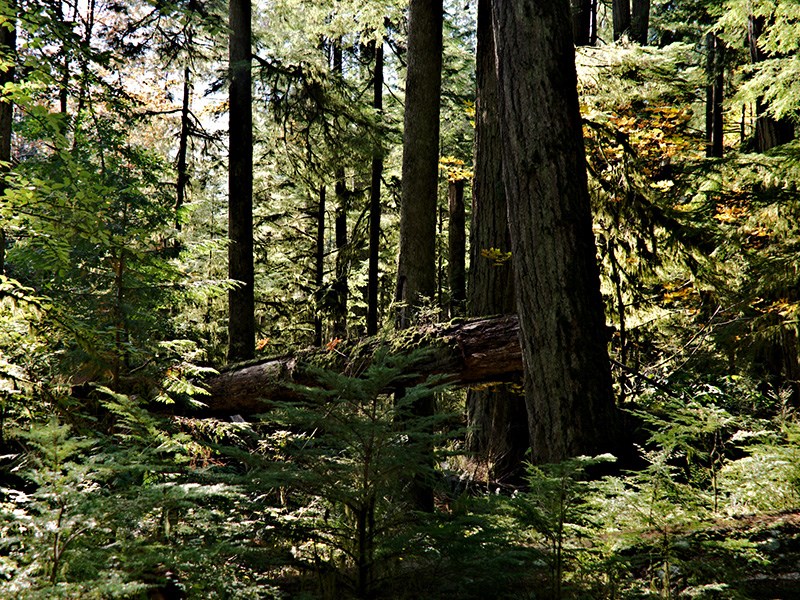City of Powell River and qathet Regional District have been prompted to send letters to the provincial government endorsing recommendations in the old-forests strategic review report.
Retired registered professional forester (RPF) Janet May appeared virtually before city and regional district committee of the whole meetings and reviewed the New Future for Old Forests report.
In her presentation to the regional district committee of the whole on December 10, May said she was representing the qathet old growth group concerned about old growth in the area.
She said she was specifically asking that the regional board endorse one of the report’s recommendations in response to ecosystems at high risk.
“This could take the form of writing a letter to the minister of forests, lands, natural resource operations and rural development, and also the minister of the climate change strategy,” said May.
She said the old-growth forests report was based on public review in 2019, where there were more than 18,000 survey results, 9,000 emails, hundreds of published articles and 300 submissions. The two RPFs on the panel had various findings, said May, and the most disturbing was that the law in BC has failed to meet the goal of protecting old-growth forests.
May said conflicting directives within the laws govern forest management.
The report suggests a paradigm shift in managing forests, ecosystem health and resilience, said May, led by public goals that are transparent, recognizing that forests have many values, such as habitat, water systems, air filtration, biodiversity, as well as products for humans. An example in qathet is the tourism industry, she said.
“We are just being discovered as the beautiful place we are and changing world values have increased the importance of the old forests and the wildlife that lives there,” said May. “BC forest management has to keep pace with that and reflect those changing world values.”
She said the old thinking is about managed forests being for timber production above everything else. She said if forests were only managed for timber, it would be like managing human health systems and only managing for surgery.
“Nobody is suggesting we don’t do surgery, but it’s not the only thing we manage for in health,” said May. “We are not suggesting that we don’t do logging, but we do think we need to be more holistic in our forest management.
“Even though this review was to focus on old growth, the recommendations cover overall forestry management, with overarching goals.”
The basic kernel is that the province is running out of old growth, and it is going to have to stop being logged at some point, said May. She asked why the province can’t have its cake and eat it, too?
“Why not save what we’ve got where it needs to be saved and have that as an asset for our province, as well as a forest industry,” said May.
One recommendation that should be enacted immediately, she said, is to engage with indigenous governments on government-to-government involvement.
The other May sees as important, recommendation number six, is an immediate response to ecosystems at very high risk.
May said the regional board was being asked to write a letter endorsing the recommendations, specifically recommendation six, which is the one that needs most priority.
City director CaroleAnn Leishman said she wanted to make a motion to receive the report called the New Future for Old Forests. She said she was in favour of writing a letter to the two ministers May recommended.
City director George Doubt wondered about the possible economic impact resulting from the recommendations.
May said from the point of view of the region’s tenure holders, Western Forest Products is the largest one, and old growth is a small component, between five and 10 per cent of its annual cut. May said the government has been advised by the report that there would need to be some recognition and compensation, especially for small businesses.
“In our area there wouldn’t be that many I don’t think that would require that much compensation, but in other areas of the province, it’s an important part of the package,” said May.
Leishman moved that the committee recommend the regional board receive the report. The committee carried the recommendation.
Leishman then recommended a further presentation be arranged to provide detail for board members who are interested in the topic.
“If we had a detailed webinar specifically on this issue, looking at the details in the report, once the board members have read the report, we’ll likely have more questions,” said Leishman.
May said she would be happy to come back with her colleagues and lead a webinar explaining more because there is so much more to present.
The city’s committee of the whole received a similar presentation from May at its December 15 meeting. She recommended the city work with the Powell River Community Forest manager to ensure immediate protection of old forest at very high risk. She also recommended sending a letter to the BC government endorsing the recommendations in the report.
The third recommendation was that the city present a resolution at an Association of Vancouver Island and Coastal Communities and Union of BC Municipalities meeting in support of implementing all recommendations from the old-forest strategic review.
Councillor Rob Southcott introduced a motion to send a letter to the BC government endorsing the recommendations in the old-growth strategic review, especially recommendation six. After extensive discussion, the committee voted to postpone the motion until consultation with Tla’amin Nation. The motion carried.
Chief administrative officer Russell Brewer said he would reach out to Tla’amin.



